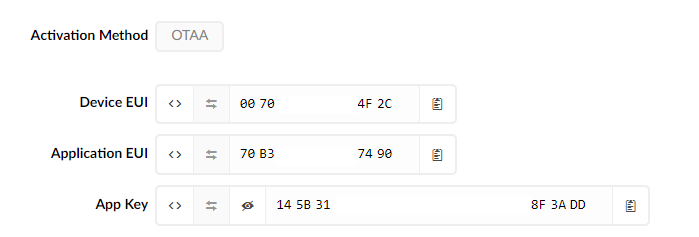Hello,
I want to use a Dragino LG308-868 LoRaWAN gateway to push some data from my sensors into TTN. The gateway is configured and connected with my TTN account. The next step is to push some data from my ESP over the gateway into TTN, but my application (I´m using the LoRaWAN LMIC library) doesn´t transmit the data:
Starting
RXMODE_RSSI
3767: engineUpdate, opmode=0x808
Packet queued
3805: EV_JOINING
3812: engineUpdate, opmode=0xc
3835: Unknown event
3908: TXMODE, freq=905300000, len=23, SF=10, BW=125, CR=4/5, IH=0
start single rx: now-rxtime: 3
339467: RXMODE_SINGLE, freq=927500000, SF=10, BW=500, CR=4/5, IH=0
rxtimeout: entry: 340367 rxtime: 339460 entry-rxtime: 907 now-entry: 5 rxtime-txend: 312375
start single rx: now-rxtime: 3
401967: RXMODE_SINGLE, freq=923300000, SF=12, BW=500, CR=4/5, IH=0
rxtimeout: entry: 405555 rxtime: 401960 entry-rxtime: 3595 now-entry: 4 rxtime-txend: 374875
405576: Unknown event
405584: engineUpdate, opmode=0xc
441847: engineUpdate, opmode=0xc
441863: Unknown event
441930: TXMODE, freq=904600000, len=23, SF=8, BW=500, CR=4/5, IH=0
I use the following keys from TTN (OTAA) and the following application code:

#define LMIC_DEBUG_LEVEL 1
#include <Arduino.h>
#include <lmic.h>
#include <hal/hal.h>
#include <SPI.h>
// This EUI must be in little-endian format, so least-significant-byte
// first. When copying an EUI from ttnctl output, this means to reverse
// the bytes. For TTN issued EUIs the last bytes should be 0xD5, 0xB3,
// 0x70.
static const u1_t PROGMEM APPEUI[8] = { 0x90, 0x74, 0x03, 0xD0, 0x7E, 0xD5, 0xB3, 0x70 };
void os_getArtEui (u1_t* buf){ memcpy_P(buf, APPEUI, 8); }
// This should also be in little endian format, see above.
static const u1_t PROGMEM DEVEUI[8] = { 0x2C, 0x4F, 0xEE, 0xBE, 0x3A, 0x12, 0x70, 0x00 };
void os_getDevEui (u1_t* buf){ memcpy_P(buf, DEVEUI, 8); }
// This key should be in big endian format (or, since it is not really a
// number but a block of memory, endianness does not really apply). In
// practice, a key taken from ttnctl can be copied as-is.
// The key shown here is the semtech default key.
static const u1_t PROGMEM APPKEY[16] = { 0x47, 0x5B, 0x31, 0xDF, 0x77, 0x4F, 0xD8, 0x78, 0x23, 0x30, 0xCE, 0x97, 0x43, 0x8F, 0x3A, 0xDD };
void os_getDevKey (u1_t* buf){ memcpy_P(buf, APPKEY, 16); }
static uint8_t mydata[] = "Hello, world!";
static osjob_t sendjob;
const unsigned TX_INTERVAL = 60;
const lmic_pinmap lmic_pins = {
.nss = 5,
.rxtx = LMIC_UNUSED_PIN,
.rst = 14,
.dio = {2, 22, LMIC_UNUSED_PIN},
};
void do_send(osjob_t* j);
void onEvent(ev_t Event)
{
Serial.print(os_getTime());
Serial.print(": ");
switch(Event)
{
case EV_SCAN_TIMEOUT:
Serial.println(F("EV_SCAN_TIMEOUT"));
break;
case EV_BEACON_FOUND:
Serial.println(F("EV_BEACON_FOUND"));
break;
case EV_BEACON_MISSED:
Serial.println(F("EV_BEACON_MISSED"));
break;
case EV_BEACON_TRACKED:
Serial.println(F("EV_BEACON_TRACKED"));
break;
case EV_JOINING:
Serial.println(F("EV_JOINING"));
break;
case EV_JOINED:
Serial.println(F("EV_JOINED"));
{
u4_t netid = 0;
devaddr_t devaddr = 0;
u1_t nwkKey[16];
u1_t artKey[16];
LMIC_getSessionKeys(&netid, &devaddr, nwkKey, artKey);
Serial.print("netid: ");
Serial.println(netid, DEC);
Serial.print("devaddr: ");
Serial.println(devaddr, HEX);
Serial.print("artKey: ");
for(uint8_t i = 0; i < sizeof(artKey); ++i)
{
Serial.print(artKey[i], HEX);
}
Serial.println("");
Serial.print("nwkKey: ");
for(uint8_t i = 0; i < sizeof(nwkKey); ++i)
{
Serial.print(nwkKey[i], HEX);
}
Serial.println("");
LMIC_setSeqnoUp(140);
}
// Disable link check validation (automatically enabled
// during join, but not supported by TTN at this time).
LMIC_setLinkCheckMode(0);
break;
case EV_RFU1:
Serial.println(F("EV_RFU1"));
break;
case EV_JOIN_FAILED:
Serial.println(F("EV_JOIN_FAILED"));
break;
case EV_REJOIN_FAILED:
Serial.println(F("EV_REJOIN_FAILED"));
break;
break;
case EV_TXCOMPLETE:
Serial.println(F("EV_TXCOMPLETE (includes waiting for RX windows)"));
if(LMIC.txrxFlags & TXRX_ACK)
Serial.println(F("Received ack"));
if(LMIC.dataLen)
{
Serial.print(F("Received "));
Serial.print(LMIC.dataLen);
Serial.println(F(" bytes of payload"));
}
// Schedule next transmission
os_setTimedCallback(&sendjob, os_getTime()+sec2osticks(TX_INTERVAL), do_send);
break;
case EV_LOST_TSYNC:
Serial.println(F("EV_LOST_TSYNC"));
break;
case EV_RESET:
Serial.println(F("EV_RESET"));
break;
case EV_RXCOMPLETE:
Serial.println(F("EV_RXCOMPLETE"));
break;
case EV_LINK_DEAD:
Serial.println(F("EV_LINK_DEAD"));
break;
case EV_LINK_ALIVE:
Serial.println(F("EV_LINK_ALIVE"));
break;
default:
Serial.println(F("Unknown event"));
break;
}
}
void do_send(osjob_t* j)
{
if(LMIC.opmode & OP_TXRXPEND)
{
Serial.println(F("OP_TXRXPEND, not sending"));
}
else
{
// Prepare upstream data transmission at the next possible time.
LMIC_setTxData2(1, mydata, sizeof(mydata) - 1, 0);
Serial.println(F("Packet queued"));
}
}
void setup()
{
Serial.begin(115200);
Serial.println("Starting");
os_init();
LMIC_reset();
LMIC_setLinkCheckMode(0);
LMIC_setDrTxpow(DR_SF7, 14);
LMIC_selectSubBand(1);
do_send(&sendjob);
}
void loop()
{
os_runloop_once();
}
So what is wrong with this code?
